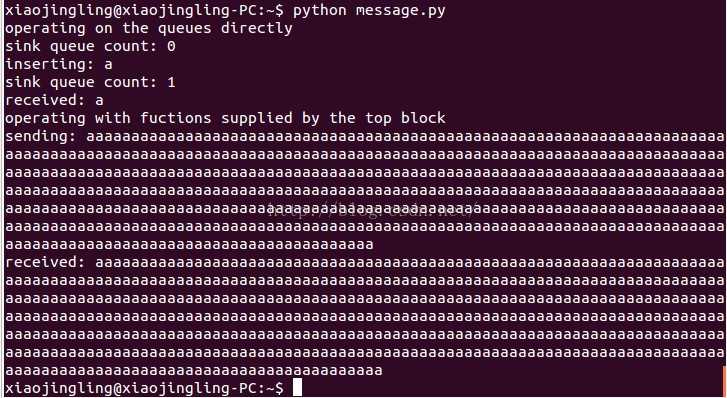- python中redirect如何传值_传递参数时重定向 - python
叫我柴先生
在烧瓶中,我可以这样做:render_template("foo.html",messages={'main':'hello'})如果foo.html包含{{messages['main']}},则页面将显示hello。但是,如果有一条通往foo的路线怎么办:@app.route("/foo")defdo_foo():#dosomelogicherereturnrender_template("f
- Windows蓝牙驱动开发-蓝牙 IOCTL
程序员王马
Windows蓝牙驱动开发windows驱动开发
蓝牙驱动程序堆栈为配置文件驱动程序提供了多个IOCTL,来收集有关以下内容的信息:本地蓝牙无线电和系统;远程蓝牙设备;会使即插即用(PnP)管理器加载配置文件驱动程序的设备;为收集有关本地蓝牙无线电和系统的信息,配置文件驱动程序会使用IOCTL_BTH_GET_LOCAL_INFO。IOCTL返回后,其AssociatedIrp.SystemBuffer成员包含指向BTH_LOCAL_RADIO_
- python微信库itchat_用python写一个微信群发工具(基于itchat库)
weixin_39654619
python微信库itchat
fromwxpyimport*fromtimeimportsleepimportrandombot=Bot(cache_path=True)#print('防止微信账号违规操作被封,每次发送信息时间间隔为随机0-1.5s')message=input('请输入要发送的微信信息:')friends_number=input('请输入账号好友数量:')number=int(friends_number
- ./yolov8_det: error while loading shared libraries: libnvinfer.so.8: cannot open shared object file:
小鲁嵌入式开发之路
YOLOlinux运维
tensorrt编译的时候报错动态链接库有问题,直接吧把libnvinfer.so.8所在文件夹下的所有文件全部复制到根目录下:/usr/lib/sudocp-rf/home/lzw/TensorRT-8.6.1.6/targets/x86_64-linux-gnu/lib/*/usr/lib/然后重新建立连接sudoln-sf/home/lzw/TensorRT-8.6.1.6/targets/
- SpringCloud-05-OpenFeign服务接口调用
六甲横宝
SpringCloud微服务Javajavaspringeurekaspringboot
OpenFeign服务接口调用1.概述1.OpenFeign是什么?Feign是一个声名式WebService客户端,使用Feign能让编写WebService客户端更加简单。它的使用方法是定义一个服务接口然后在上面添加注解。Feign也支持可拔插式的编码器和解码器。SpringCloud对Feign进行了封装,使其支持了SpringMVC标准注解和HttpMessageConverters。Fe
- 微信小程序之单选框
ch_s_t
微信小程序微信小程序notepad++小程序
微信小程序中的单选框(Radio)是一个常用的输入组件,用于在多个选项中进行选择。常见的应用场景有性别选择、选项过滤、问卷调查等。本文将介绍小程序中单选框的特点和作用及相应示例。一、单选框的特点和作用特点:单一选择:用户只能选择一个选项,适合于互斥项的选择。分组显示:单选框通常是一个选项组的形式,多个单选框的组合,一般会有相同的name属性,以便在选择时实现互斥效果。简洁明了:界面简洁,有助于用户
- HarmonyOS使用Grid网格实现计算器功能实现
青椒1013
harmonyos
使用Grid网格处理,实现了计算器的加减乘除功能@Entry@ComponentstructGridPage{@Statestr:string="";//暂存区@Statenum:string="0";//输入区@StateflagNum:boolean=false;//标识build(){Column(){Grid(){GridItem(){Text(this.str)//默认为空}.colum
- Python 网页控制自动化 getEdgeDriver
chenchihwen
服务器mysql运维
透过python使用edge执行自动化时,原来的代码出现报错了执行报错啦:messageinfo如下显示HTTPSConnectionPool(host='msedgedriver.azureedge.net',port=443):Maxretriesexceededwithurl:/130.0.2849/edgedriver_win64.zip(CausedbyNewConnectionErro
- ElMessageBox显示在浏览器的左下角问题
问题原因:elementplus已经做了按需引入,再导入ElMessageBox,就会导致弹框显示在左下角修改方法:将导入注释或者删除掉就可正常//import{ElMessageBox}from'element-plus'
- Vue的动态绑定
m0_74169345
javascript前端vue.js
Vue的动态绑定是其核心功能之一,通过它可以实现数据与视图之间的双向绑定,当数据发生变化时,视图会自动更新,反之亦然。以下是几种常见的动态绑定方式:数据绑定插值表达式:使用双大括号{{}}将数据插入到模板中。例如{{message}},当message数据发生变化时,页面上对应的位置会自动更新显示新的值。这种方式主要用于文本内容的绑定。v-text指令:与插值表达式类似,也是用于绑定文本内容。例如
- GPLv3.0协议介绍
萌萌哒240
软件工具网络tcp/ip网络协议
GPLv3.0,即GNU通用公共许可证第三版,是开源软件领域广泛采用的一种许可协议。以下是对GPLv3.0协议的详细介绍:一、协议背景GPLv3.0由理查德·斯托曼编写,旨在保护开源软件作者的权益,同时鼓励代码的共享和再创新。作为自由软件和开源软件的最流行许可证之一,GPLv3.0在开源社区中具有重要地位。二、主要特点传染性:这是GPLv3.0最显著的特点。任何基于GPLv3.0软件开发的衍生作品
- wordpress常见数据库连接错误原因及其解决方案
wodrpress资源分享
数据库wordpress
WordPress数据库连接错误通常是由于数据库配置问题、数据库服务器问题或权限问题引起的。以下是一些常见的数据库连接错误及其解决方案:常见错误信息1.“Errorestablishingadatabaseconnection”2.“WordPressdatabaseerror:[Errormessage]”3.“Unknowndatabase”4.“Accessdeniedforuser”常见原
- EOF分析在Python中的利器:eofs库使用指南
潘妙霞
EOF分析在Python中的利器:eofs库使用指南项目地址:https://gitcode.com/gh_mirrors/eo/eofs项目介绍eofs是一个专为Python环境设计的开源包,用于执行经验正交分解(EmpiricalOrthogonalFunction,EOF)分析。该库遵循GNUGPLv3许可协议,旨在简化Python中进行EOF分析的流程。它特别适合处理大型时空数据集,通过高
- Rabbitmq源码分析,重复消费问题的redis或数据库代码实现
xweiran
rabbitmq分布式java架构jvm数据结构后端
目录底层源码解析自定义唯一id算法MessageProperties类的相关实现自定义消息ID生成器配置和使用Rabbitmq是怎么判断是不是重复消息的呢?通过Redis的幂等性处理消息消费者实现分布式锁实现的重复检测完整的消息处理流程基于数据库实现Mapper接口消息处理服务RabbitMQ消息消费者底层源码解析RabbitMQ判断重复消息主要通过消息的唯一标识(MessageId)和幂等性处理
- WRF模式与Python融合技术及精美绘图
岁月如歌,青春不败
气象学python开发语言wrf气象科学大气科学气象学
一:WRF基础与Linux基础1WRF基础与Linux基础1.1WRF模式的理论知识与应用前景WRF动力理论WRF模式代码框架WRF模式应用前景1.2Linux知识与基本操作Linux基本命令设置定时任务超算提交任务1.3WRF模式安装基础库安装(GNU编译器、zlib、libpng、jasper、hdf5、netcdf4、mpich2)WRF/WPS安装二:WRF模式运行2WRF模式运行2.1W
- 支持selenium的chromedriver更新到131.0.6778.87
代码的乐趣
selenium测试工具
最近chrome释放新版本:131.0.6778.87如果运行selenium自动化测试出现以下问题,是需要升级chromedriver才可以解决的。selenium.common.exceptions.SessionNotCreatedException:Message:sessionnotcreated:ThisversionofChromeDriveronlysupportsChromeve
- qt编写linux守护进程,QT开发(三十五)——QT进程间通信
周恰恰
qt编写linux守护进程
QT开发(三十五)——QT进程间通信Qt是一个跨平台的应用框架,其进程间通信机制当然可以使用所在平台的进程间通信机制,如在Windows平台上的Message机制、共享内存、文件映射、管道、Socket等。其中,Qt对一些许多平台共有的IPC机制进行了封装。一、TCP/IP其实就是通过网络模块实现的IPC。不过Qt对其进行了封装,并提供了两个层次的API,包括应用程序级的QNetworkAcces
- 网页端基于js的图片裁剪
天外来鹿
javascripthtmljavascripthtmljscss
效果预览点击下载前往码云下载相应js使用说明CDN使用window.clip=newClip({dragBoxClass:'block',//裁剪框类名clipRadio:1/1,//裁剪比例宽/高传0或空或不传等于不设置比例//单位px仅为裁剪框的宽高不等同裁剪后最终图片宽高initialHeight:100,//裁剪框初始高度initialWidth:100,//裁剪框初始宽度minHeigh
- HarmonyOS ArkUi Tabs+TabContent+List实现tab吸顶功能
Join下班了吗
harmonyos
Demo效果@Entry@ComponentstructStickyNestedScroll{@Statemessage:string='HelloWorld'@Statearr:number[]=[]scroller=newScroller()@StyleslistCard(){.backgroundColor(Color.White).height(72).width("100%").bord
- redisson 连接 redis5报错 ERR wrong number of arguments for ‘auth‘ command
路过君_P
springspringboot后端redis
依赖版本org.redisson:redisson-spring-boot-starter:3.25.2现象启动报错org.redisson.client.RedisException:ERRwrongnumberofargumentsfor‘auth’command.channel:[xxx]command:(AUTH),params:(passwordmasked)原因redis6以下版本认证
- QT 通过QAxObject与本地应用程序读取Excel内容
梦里藍天
QT5qtexcel开发语言
首先在配置中加入QT+=axcontainer在开发过程中,经常需要与Excel文件进行交互,例如读取数据、写入数据或进行格式设置。Qt提供了一个强大的类QAxObject,通过它可以方便地操作Excel文件。QAxObjectexcel("ket.Application");if(excel.isNull()){QMessageBox::critical(this,"错误","没有发现Excel
- 《Python内置模块010:gzip、zipfile用于处理压缩文件的模块》
大大大钢琴
#Python:各类模块(代码)python数据库服务器
gzip、zipfile:用于处理压缩文件的模块一、常用方法(一)gzip模块(1)功能:主要用于处理GNUzip格式的压缩文件(.gz)。它支持单一文件的压缩和解压缩。(2)常用方法:gzip.open(filename,mode):打开一个gzip压缩文件,支持读('r')、写('w')、追加('a')等模式。gzip.compress(data):压缩数据并返回压缩后的字节对象。gzip.d
- debian12实践-安装docker
Nobita Chen
dockereureka容器
参考:https://linuxiac.com/how-to-install-docker-on-debian-12-bookworm/step1sudoaptupdatesudoaptinstallapt-transport-httpsca-certificatescurlgnupgstep2:这一步多尝试两次,避免网络原因下载失败curl-fsSLhttps://download.docker
- Linux/MacOS中如何远程调试C/C++程序
捕鲸叉
软件调试和诊断linuxmacos软件调试
在Linux或macOS中远程调试C/C++程序,可以使用gdb(GNUDebugger)或lldb(LLVMDebugger)结合SSH或NAT/VPN来实现远程调试。以下是详细的步骤和方法:1.远程调试的需求和准备目标机器:运行需要调试的程序(通常是远程服务器)。调试机器:运行调试器(通常是本地开发机)。目标程序:必须是使用调试符号(-g选项)编译的C/C++程序。编译程序确保目标程序是用调试
- Java 异常架构Throwable
Flying_Fish_Xuan
java架构开发语言
1.Throwable类的概述在Java中,Throwable是所有错误和异常的超类。只有继承自Throwable类的实例可以被抛出或捕获。Throwable类本身是java.lang.Object的直接子类,它定义了异常处理的一些基本机制,如异常的堆栈轨迹、错误消息等。Throwable类的主要方法:getMessage():返回异常的详细描述信息。getLocalizedMessage():返
- SpringBoot整合OpenFeign和Hystrix
·yying·
java分布式springboothystrix后端
Feign和hystrix开启hystrix熔断器application.ymlfeign:hystrix:enabled:true方式一:简单,但无法获取异常信息和状态号FeignClient类@FeignClient(value="eureka-client-express-message",fallback=MessageClientHystrix.class)publicinterface
- 发布工具包 到npm 服务
pzpcxy520
npm前端node.js
操作步骤如下:1.创建文件夹,并创建文件index.js,在文件中声明函数,使用module.exports暴露2.npm初始化工具包,package.json填写包的信息(包的名字是唯一的)3.注册账号https://www.npmjs.com/signup4.激活账号(一定要激活账号)5.修改为官方的官方镜像(命令行中运行nrmusenpm)6.命令行下npmlogin填写相关用户信息7.命令
- 苹果 iMessage 新玩法:用一条信息就能打造你的迷你博客
文章目录通过iMessage重新定义个人博客写作什么是iMessage?为什么选择Public.me?如何使用Public.me?三步开启你的写作之旅Public.me的乐趣技术揭秘:Public.me如何工作?dockur/macosimessage-exporter如何协同工作苹果用户使用iMessage的注意事项结语本文分享一个有趣网站——Public.me,它可以让苹果用户通过简单的iMe
- 我常用的 Git 命令汇总(持久更新)
git
修改暂存区(未提交)的commitgitcommit--amendgitcommit--amend-m"Newcommitmessage"删除远程分支gitpushorigin:dev在dev分支,查看main分支的某个文件内容gitshowmain:README.md在dev分支,复制main分支的文件或文件夹gitcheckoutmain--README.md创建空白分支gitswitch--
- nodejs创建ws服务器,前端浏览器用websocket接收信息和发送信息给服务端
cdcdhj
nodejs服务器前端websocket
首页是用nodejs建立服务器端//wsserver.jsconstWebSocket=require('ws');constwss=newWebSocket.Server({port:8080});wss.on('connection',functionconnection(ws){ws.on('error',console.error);//接收客户端发送过来的信息ws.on('message
- mondb入手
木zi_鸣
mongodb
windows 启动mongodb 编写bat文件,
mongod --dbpath D:\software\MongoDBDATA
mongod --help 查询各种配置
配置在mongob
打开批处理,即可启动,27017原生端口,shell操作监控端口 扩展28017,web端操作端口
启动配置文件配置,
数据更灵活
- 大型高并发高负载网站的系统架构
bijian1013
高并发负载均衡
扩展Web应用程序
一.概念
简单的来说,如果一个系统可扩展,那么你可以通过扩展来提供系统的性能。这代表着系统能够容纳更高的负载、更大的数据集,并且系统是可维护的。扩展和语言、某项具体的技术都是无关的。扩展可以分为两种:
1.
- DISPLAY变量和xhost(原创)
czmmiao
display
DISPLAY
在Linux/Unix类操作系统上, DISPLAY用来设置将图形显示到何处. 直接登陆图形界面或者登陆命令行界面后使用startx启动图形, DISPLAY环境变量将自动设置为:0:0, 此时可以打开终端, 输出图形程序的名称(比如xclock)来启动程序, 图形将显示在本地窗口上, 在终端上输入printenv查看当前环境变量, 输出结果中有如下内容:DISPLAY=:0.0
- 获取B/S客户端IP
周凡杨
java编程jspWeb浏览器
最近想写个B/S架构的聊天系统,因为以前做过C/S架构的QQ聊天系统,所以对于Socket通信编程只是一个巩固。对于C/S架构的聊天系统,由于存在客户端Java应用,所以直接在代码中获取客户端的IP,应用的方法为:
String ip = InetAddress.getLocalHost().getHostAddress();
然而对于WEB
- 浅谈类和对象
朱辉辉33
编程
类是对一类事物的总称,对象是描述一个物体的特征,类是对象的抽象。简单来说,类是抽象的,不占用内存,对象是具体的,
占用存储空间。
类是由属性和方法构成的,基本格式是public class 类名{
//定义属性
private/public 数据类型 属性名;
//定义方法
publ
- android activity与viewpager+fragment的生命周期问题
肆无忌惮_
viewpager
有一个Activity里面是ViewPager,ViewPager里面放了两个Fragment。
第一次进入这个Activity。开启了服务,并在onResume方法中绑定服务后,对Service进行了一定的初始化,其中调用了Fragment中的一个属性。
super.onResume();
bindService(intent, conn, BIND_AUTO_CREATE);
- base64Encode对图片进行编码
843977358
base64图片encoder
/**
* 对图片进行base64encoder编码
*
* @author mrZhang
* @param path
* @return
*/
public static String encodeImage(String path) {
BASE64Encoder encoder = null;
byte[] b = null;
I
- Request Header简介
aigo
servlet
当一个客户端(通常是浏览器)向Web服务器发送一个请求是,它要发送一个请求的命令行,一般是GET或POST命令,当发送POST命令时,它还必须向服务器发送一个叫“Content-Length”的请求头(Request Header) 用以指明请求数据的长度,除了Content-Length之外,它还可以向服务器发送其它一些Headers,如:
- HttpClient4.3 创建SSL协议的HttpClient对象
alleni123
httpclient爬虫ssl
public class HttpClientUtils
{
public static CloseableHttpClient createSSLClientDefault(CookieStore cookies){
SSLContext sslContext=null;
try
{
sslContext=new SSLContextBuilder().l
- java取反 -右移-左移-无符号右移的探讨
百合不是茶
位运算符 位移
取反:
在二进制中第一位,1表示符数,0表示正数
byte a = -1;
原码:10000001
反码:11111110
补码:11111111
//异或: 00000000
byte b = -2;
原码:10000010
反码:11111101
补码:11111110
//异或: 00000001
- java多线程join的作用与用法
bijian1013
java多线程
对于JAVA的join,JDK 是这样说的:join public final void join (long millis )throws InterruptedException Waits at most millis milliseconds for this thread to die. A timeout of 0 means t
- Java发送http请求(get 与post方法请求)
bijian1013
javaspring
PostRequest.java
package com.bijian.study;
import java.io.BufferedReader;
import java.io.DataOutputStream;
import java.io.IOException;
import java.io.InputStreamReader;
import java.net.HttpURL
- 【Struts2二】struts.xml中package下的action配置项默认值
bit1129
struts.xml
在第一部份,定义了struts.xml文件,如下所示:
<!DOCTYPE struts PUBLIC
"-//Apache Software Foundation//DTD Struts Configuration 2.3//EN"
"http://struts.apache.org/dtds/struts
- 【Kafka十三】Kafka Simple Consumer
bit1129
simple
代码中关于Host和Port是割裂开的,这会导致单机环境下的伪分布式Kafka集群环境下,这个例子没法运行。
实际情况是需要将host和port绑定到一起,
package kafka.examples.lowlevel;
import kafka.api.FetchRequest;
import kafka.api.FetchRequestBuilder;
impo
- nodejs学习api
ronin47
nodejs api
NodeJS基础 什么是NodeJS
JS是脚本语言,脚本语言都需要一个解析器才能运行。对于写在HTML页面里的JS,浏览器充当了解析器的角色。而对于需要独立运行的JS,NodeJS就是一个解析器。
每一种解析器都是一个运行环境,不但允许JS定义各种数据结构,进行各种计算,还允许JS使用运行环境提供的内置对象和方法做一些事情。例如运行在浏览器中的JS的用途是操作DOM,浏览器就提供了docum
- java-64.寻找第N个丑数
bylijinnan
java
public class UglyNumber {
/**
* 64.查找第N个丑数
具体思路可参考 [url] http://zhedahht.blog.163.com/blog/static/2541117420094245366965/[/url]
*
题目:我们把只包含因子
2、3和5的数称作丑数(Ugly Number)。例如6、8都是丑数,但14
- 二维数组(矩阵)对角线输出
bylijinnan
二维数组
/**
二维数组 对角线输出 两个方向
例如对于数组:
{ 1, 2, 3, 4 },
{ 5, 6, 7, 8 },
{ 9, 10, 11, 12 },
{ 13, 14, 15, 16 },
slash方向输出:
1
5 2
9 6 3
13 10 7 4
14 11 8
15 12
16
backslash输出:
4
3
- [JWFD开源工作流设计]工作流跳跃模式开发关键点(今日更新)
comsci
工作流
既然是做开源软件的,我们的宗旨就是给大家分享设计和代码,那么现在我就用很简单扼要的语言来透露这个跳跃模式的设计原理
大家如果用过JWFD的ARC-自动运行控制器,或者看过代码,应该知道在ARC算法模块中有一个函数叫做SAN(),这个函数就是ARC的核心控制器,要实现跳跃模式,在SAN函数中一定要对LN链表数据结构进行操作,首先写一段代码,把
- redis常见使用
cuityang
redis常见使用
redis 通常被认为是一个数据结构服务器,主要是因为其有着丰富的数据结构 strings、map、 list、sets、 sorted sets
引入jar包 jedis-2.1.0.jar (本文下方提供下载)
package redistest;
import redis.clients.jedis.Jedis;
public class Listtest
- 配置多个redis
dalan_123
redis
配置多个redis客户端
<?xml version="1.0" encoding="UTF-8"?><beans xmlns="http://www.springframework.org/schema/beans" xmlns:xsi=&quo
- attrib命令
dcj3sjt126com
attr
attrib指令用于修改文件的属性.文件的常见属性有:只读.存档.隐藏和系统.
只读属性是指文件只可以做读的操作.不能对文件进行写的操作.就是文件的写保护.
存档属性是用来标记文件改动的.即在上一次备份后文件有所改动.一些备份软件在备份的时候会只去备份带有存档属性的文件.
- Yii使用公共函数
dcj3sjt126com
yii
在网站项目中,没必要把公用的函数写成一个工具类,有时候面向过程其实更方便。 在入口文件index.php里添加 require_once('protected/function.php'); 即可对其引用,成为公用的函数集合。 function.php如下:
<?php /** * This is the shortcut to D
- linux 系统资源的查看(free、uname、uptime、netstat)
eksliang
netstatlinux unamelinux uptimelinux free
linux 系统资源的查看
转载请出自出处:http://eksliang.iteye.com/blog/2167081
http://eksliang.iteye.com 一、free查看内存的使用情况
语法如下:
free [-b][-k][-m][-g] [-t]
参数含义
-b:直接输入free时,显示的单位是kb我们可以使用b(bytes),m
- JAVA的位操作符
greemranqq
位运算JAVA位移<<>>>
最近几种进制,加上各种位操作符,发现都比较模糊,不能完全掌握,这里就再熟悉熟悉。
1.按位操作符 :
按位操作符是用来操作基本数据类型中的单个bit,即二进制位,会对两个参数执行布尔代数运算,获得结果。
与(&)运算:
1&1 = 1, 1&0 = 0, 0&0 &
- Web前段学习网站
ihuning
Web
Web前段学习网站
菜鸟学习:http://www.w3cschool.cc/
JQuery中文网:http://www.jquerycn.cn/
内存溢出:http://outofmemory.cn/#csdn.blog
http://www.icoolxue.com/
http://www.jikexue
- 强强联合:FluxBB 作者加盟 Flarum
justjavac
r
原文:FluxBB Joins Forces With Flarum作者:Toby Zerner译文:强强联合:FluxBB 作者加盟 Flarum译者:justjavac
FluxBB 是一个快速、轻量级论坛软件,它的开发者是一名德国的 PHP 天才 Franz Liedke。FluxBB 的下一个版本(2.0)将被完全重写,并已经开发了一段时间。FluxBB 看起来非常有前途的,
- java统计在线人数(session存储信息的)
macroli
javaWeb
这篇日志是我写的第三次了 前两次都发布失败!郁闷极了!
由于在web开发中常常用到这一部分所以在此记录一下,呵呵,就到备忘录了!
我对于登录信息时使用session存储的,所以我这里是通过实现HttpSessionAttributeListener这个接口完成的。
1、实现接口类,在web.xml文件中配置监听类,从而可以使该类完成其工作。
public class Ses
- bootstrp carousel初体验 快速构建图片播放
qiaolevip
每天进步一点点学习永无止境bootstrap纵观千象
img{
border: 1px solid white;
box-shadow: 2px 2px 12px #333;
_width: expression(this.width > 600 ? "600px" : this.width + "px");
_height: expression(this.width &
- SparkSQL读取HBase数据,通过自定义外部数据源
superlxw1234
sparksparksqlsparksql读取hbasesparksql外部数据源
关键字:SparkSQL读取HBase、SparkSQL自定义外部数据源
前面文章介绍了SparSQL通过Hive操作HBase表。
SparkSQL从1.2开始支持自定义外部数据源(External DataSource),这样就可以通过API接口来实现自己的外部数据源。这里基于Spark1.4.0,简单介绍SparkSQL自定义外部数据源,访
- Spring Boot 1.3.0.M1发布
wiselyman
spring boot
Spring Boot 1.3.0.M1于6.12日发布,现在可以从Spring milestone repository下载。这个版本是基于Spring Framework 4.2.0.RC1,并在Spring Boot 1.2之上提供了大量的新特性improvements and new features。主要包含以下:
1.提供一个新的sprin
